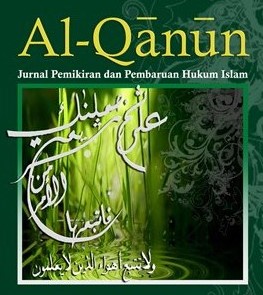Pergeseran Hukum Keluarga di Maroko dari Mudawwanah Tahun 1957-1958 ke Mudawwanah Tahun 2004
DOI:
https://doi.org/10.15642/alqanun.2022.25.2.233-247Abstract
A law being reviewed and amended would not be a strange phenomenon. In Morocco, family law has been changed from the old Mudawwanah to the new Mudawwanah. Even though they belong to the Maliki school of thought, Morocco still wants to take from other schools that they feel are more substantial and beneficial. This article intends to explain the shift in family law provisions in Morocco from the old Mudawwanah, ratified in 1957-58, to the new Mudawwanah, approved in 2004. Despite opposition from various groups, the Mudawwanah al-Usrah in 2004 was successfully ratified and enforced for Moroccan citizens. Many parties, especially gender activists, praised the 2004 Mudawwanah as a progressive family law that cares about gender in Arab countries. There were at least seventeen issues in the 2004 Mudawwanah, which underwent quite fundamental and significant shifts compared to the provisions in the previous Mudawwanah. The new provision seeks to strengthen the rights and position of Moroccan women as well as legal protection and guarantees for children.
Abstrak: Sebuah undang-undang ditinjau dan diamandemen kiranya bukan persoalan aneh lagi. Di Maroko, telah terjadi amandemen hukum keluarga cukup signifikan dari Mudawwanah lama dengan Mudawwanah baru. Walau bermazhab Maliki, namun Maroko tetap mau mengambil dari mazhab lain yang dirasa lebih kuat dan maslahat. Artikel ini hendak menjelaskan pergeseran ketentuan hukum keluarga di Maroko dari Mudawwanah lama yang disahkan tahun 1957-58 dengan Mudawwanah baru yang disahkan tahun 2004. Walau ada penentangan dari berbagai kalangan, namun akhirnya Mudawwanah al-Usrah tahun 2004 berhasil disahkan dan diberlakukan bagi warga negara Maroko. Banyak pihak terutama aktifis jender memuji Mudawwanah tahun 2004 sebagai hukum keluarga yang progresif dan peduli jender untuk ukuran negeri-negeri Arab. Sekurangnya ada tujuh belas isu dalam Mudawwanah tahun 2004 yang mengalami pergeseran cukup mendasar dan signifikan dibanding ketentuan dalam Mudawwanah sebelumnya. Ketentuan baru tersebut pada dasarnya berupaya untuk menguatkan hak-hak dan kedudukan kaum wanita Maroko serta perlindungan dan jaminan hukum bagi anak-anak.
Downloads
References
Aixelà Cabré, Yolanda. “The Mudawwana and Koranic law from a gender perspective. The substantial changes in the Moroccan family code of 2004.” Language and Intercultural Communication 7, no. 2 (2007): 133–43.
Anello, Giancarlo. “The Reform of the Moroccan «Mudawwanah» in the Intercultural-Law Charts.” Dionysiana IV, no. 1 (2010).
———. “The Reform of the Moroccan «Mudawwanah» in the Intercultural-Law Charts.” Dionysiana IV, no. 1 (2010).
Asy-Syafi’i, Muhammad. Az-Zawaj fi Mudawwanah al-Usrah. Marakesy: al-Mathba’ah wa al-Waraqah al-Wathaniyyah, 2005.
Buskens, Léon. “RECENT DEBATES ON FAMILY LAW REFORM IN MOROCCO: ISLAMIC LAW AS POLITICS IN AN EMERGING PUBLIC SPHERE.” Islamic Law and Society 10, no. 1 (2003): 70–131. https://doi.org/10.1163/15685190360560924.
———. “Recent debates on family law reform in Morocco: Islamic law as politics in an emerging public sphere.” Islamic law and society 10, no. 1 (2003): 70–131.
Charrad, Mounira M. “Family law reforms in the Arab world: Tunisia and Morocco.” Dalam report for the United Nations Department of Economic and Social Affairs (UNDESA), Expert Group Meeting, New York, 15–17, 2012.
Daud, Fathonah K., dan Nurrohman Syarif. “HAK CERAI PEREMPUAN DALAM HUKUM KELUARGA ISLAM MAROKO.” Al-Ahwal: Jurnal Hukum Keluarga Islam 14, no. 2 (t.t.): 159–72.
———. “HAK CERAI PEREMPUAN DALAM HUKUM KELUARGA ISLAM MAROKO.” Al-Ahwal: Jurnal Hukum Keluarga Islam 14, no. 2 (t.t.): 159–72.
Dieste, Josep Lluis Mateo. “Demonstrating Islam”: The Conflict of Text and the Mudawwana Reform in Morocco.” The Muslim World 99, no. 1 (2009): 134–54.
Hanafi, Leila. “The implementation of Morocco’s 2004 Family Code Moudawana: stock-taking & recommendations.” The Danish Center for Research and Information on Gender, Equality and Diversity KVINFO 9, no. 09 (2013): 2014.
Harrak, Fatima. “The history and significance of the new Moroccan family code.” Institute for the Study of Islamic Thought in Africa (ISITA), Working Paper Series, 2009.
———. “The history and significance of the New Moroccan family code.” Institute for the Study of Islamic Thought in Africa (ISITA), Working Paper Series, 2009.
Hursh, John. “Advancing women’s rights through Islamic law: The example of Morocco.” Berkeley J. Gender L. & Just. 27 (2012): 252.
———. “Advancing Women’s Rights through Islamic Law: The Example of Morocco.” Berkeley Journal of Gender, Law & Justice 27 (2012): 252.
“Introduction to the Moroccan Legal System - GlobaLex.” Diakses 29 Juli 2022. https://www.nyulawglobal.org/globalex/Morocco.html.
Juliandi, Budi, Fauzun Jamal, dan Saifuddin Herlambang. “Mudawwanah Al-Usrah dan Pemihakan Terhadap Hak-Hak Perempuan di Maroko.” Dalam Proceedings of Annual Conference for Muslim Scholars, 122–29, 2017.
Ma’afi, Rif’at Husnul. “Penerapan dan Pembaharuan Hukum IslamDalam Tata Hukum Mesir dan Turki.” Al-Qānūn: Jurnal Pemikiran dan Pembaharuan Hukum Islam 13, no. 1 (Juni 2010).
Mahfudhi, Heri Mahfudhi. “Pengaruh Sosio-Kultur terhadap Reformasi Hukum Keluarga Islam di Maroko.” MIYAH: Jurnal Studi Islam 18, no. 1 (2022): 59–74.
March, Beatrice. “Divorce Experiences: What The 2004 Moudawana Does and Does Not Do for Women In Morocco,” t.t., 36.
“Maroko.” Dalam Wikipedia bahasa Indonesia, ensiklopedia bebas, 21 Juni 2022. https://id.wikipedia.org/w/index.php?title=Maroko&oldid=21269128.
Mir-Hosseini, Ziba. “How the door of ijtihad was opened and closed: a comparative analysis of recent family law reforms in Iran and Morocco.” Wash. & Lee L. Rev. 64 (2007): 1499.
“Morocco country profile - BBC News.” Diakses 29 Juli 2022. https://www.bbc.com/news/world-africa-14121438.
“Morocco : Development news, research, data | World Bank.” Diakses 29 Juli 2022. https://www.worldbank.org/en/country/morocco.
Muhammad asy-Syafi’i. Qanun al-Usrah fi Duwal al-Maghrib al-‘Arabi. Marakech: Maktabah al-Waraqah al-Wathaniyah., 2009.
Musthafa, Usman. “Pembaharuan Hukum Keluarga Di Maroko.” Syakhsia: Jurnal Hukum Perdata Islam 20, no. 1 (2019): 49–60.
Nour-Aissaoui, Karima. “The Current Debate on the Moroccan Family Code Mudawwanat al-Usra in Morocco.” Electronic Journal of Islamic and Middle Eastern Law (EJIMEL) 8, no. 1 (2020): 77–85.
Perkins, Elisa. “The 2004 Mudawwana reforms and the problem of Moroccan masculinity.” Al-Raida Journal, 2004, 99–104.
Santos, Ma Teresa González. “The exploitation of women in Northern Africa: The case of Morocco.” World Journal of Islamic History and Civilization 3, no. 4 (2013): 170–78.
Tahir Mahmood. Family Law Reform in The Muslim World. Bombay: NM Tripathy PVT Ltd., n.y.
———. Personal Law in Islamic Countries. New Delhi: Academy Law and Religion, 1987.
TZİANOUDAKİ, Nik. “The 2004 Moroccan Family Code: An innovation in progress Issues of private international law.” Dalam Annales de la Faculté de Droit d’Istanbul, 40:345–64, t.t.
Virkama, Anna. “Discussing Moudawana: perspectives on family law reform, gender equality and social change in Morocco.” Master’s Thesis, Joensuun yliopisto, 2006.
“التطـور التاريخـي لمدونـة الأســرة المغـربيـة.” Diakses 25 Juli 2022. https://ae.linkedin.com/pulse/%D8%A7%D9%84%D8%AA%D8%B7%D9%80%D9%88%D8%B1-%D8%A7%D9%84%D8%AA%D8%A7%D8%B1%D9%8A%D8%AE%D9%80%D9%8A-%D9%84%D9%85%D8%AF%D9%88%D9%86%D9%80%D8%A9-%D8%A7%D9%84%D8%A3%D8%B3%D9%80%D9%80%D8%B1%D8%A9-%D8%A7%D9%84%D9%85%D8%BA%D9%80%D8%B1%D8%A8%D9%8A%D9%80%D8%A9-rachid-zizaoui.






